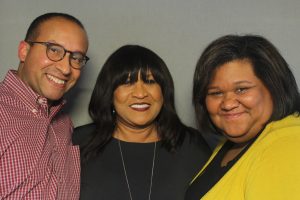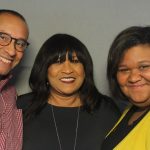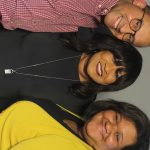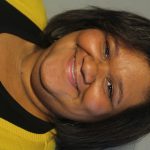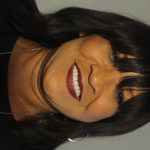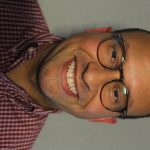Cynthia Cross, Alexander Feliz, and Nico West
Description
Cynthia Cross (61) talks with friends and colleagues Alexander Feliz (49) and Nico West (43) about what lead them to the field of medicine, influences along the way, the issue of health inequity and disparities in care, the "human side" of health care, social determinants of health, and advice for others.Subject Log / Time Code
Participants
- Cynthia Cross
- Alexander Feliz
- Nico West
Recording Locations
Crosstown ConcourseVenue / Recording Kit
Tier
Partnership
Partnership Type
OutreachInitiatives
Transcript
StoryCorps uses Google Cloud Speech-to-Text and Natural Language API to provide machine-generated transcripts. Transcripts have not been checked for accuracy and may contain errors. Learn more about our FAQs through our Help Center or do not hesitate to get in touch with us if you have any questions.
00:05 Hi, I'm dr. Cynthia Cross. I'm a pediatric hospitalist and Memphis, Tennessee. I am 61 years old. Today is September 25th, 2019, and we are in a great City of Memphis, Tennessee.
00:23 I am Alexander Feliz. I am 49 years old. Today is Wednesday, September 25th, 2019. We are in Memphis, Tennessee.
00:35 And you're coming and I'm speaking here today with my colleagues Cynthia Cross and Nico West.
00:51 My name is Nico West I am 43 years old today's date is Wednesday, September 25th, 2019. We are in Memphis, Tennessee and my partner see you today or doctor Cynthia Cross and doctors adductor Alexander Feliz.
01:16 So the three of us are Physicians two of us actually grew up here in Memphis and Alex is a little bit different in that respect. It's really nice to be able to sit down today and talk about some of our experiences and how we ended up where we are. I currently do Pediatric Hospital medicine. Sometimes people ask me. What does that mean? It means that I look after sick and injured children and a freestanding children's hospital. And I know you guys get questions from interested parties as well about what kind of work you do and what that is like Alex could you start us off with sharing some of what you tell people about what you do everyday my pleasure. I am a pediatric surgeon. So I have the privilege of taking care of little babies to teenagers and who require operations and I'm also a surgical educator
02:16 The program director for surgery at them the University of Tennessee Health Science Center, which means that I'm in charge of the education of young doctors who I want to grow up and and before flight surgeons.
02:33 Nico tell us about yourself. So I am a physician scientist with that means and I explained that a lot to people and they can mean a lot but for me that means that I am a 100% researcher. I am currently a research assistant professor with the division of pediatric Critical Care Medicine at the University of Tennessee Health Sciences Center, and I work very closely with Jesse Intensive Care Unit team at 11 or children's hospital and my area of interest is head injury. So that is my major area of research, but will also talk about some of the things that we're interested in as far as Health Equity and
03:33 Disparities today and that's another area that I'm really I'm also interested in as far as the Cesarean and being a physician scientist can can mean a lot but that's what that means to me being able to do research on this particular in this particular area and also Mentor so I am Fellowship research director for 9 clinical trainees. They are fellows of the Intensive Care Unit and I'm into them and research
04:14 I think mentoring is a really important part of what we do much of what has led to Our Success has been related to having good mentorship those people in our childhood or along the way that showed us an idea of what we wanted to do them for me growing up in Memphis in an underserved area. I didn't know any physician to looked the way I did so I actually started off in nursing went to nursing school and it was largely because there was a registered nurse who lived next door to me and when we were talking we laugh that she was way ahead of the curve because she was an African American woman who was a professional I was born in 58 and I would watch her in her uniform, but she come home from work and she was always very kind and she said when I started talking to her about wanting to be a nurse
05:14 That she thought it was cute, but she didn't think I was serious and as the years went on she realized this kids really serious and she helped me get a scholarship to go to nursing school and would ask me how my studies were going. But even before that I was really motivated by my grandparents. I growing up in the sixties 68 hours almost 10 years. So when dr. King was killed and there was a Civil Rights era and my grandparents talked a lot about my responsibility to be a good person to get my education to not let anything stand in front of me including the fact that I was what that time. We called herself Negros. So my granddad would say don't let it be that you were negro. Don't let it be that you were a girl you need to do everything. You can to be successful.
06:05 And it wasn't until later that I actually started to see myself as a doctor and I met a couple of Physicians who were also mentors to me in the neonatal Intensive Care Unit and they looked at me and said you can so do this job what's holding you back?
06:23 How about you guys Alex why I want to ask you a question with regard to what do you think? I know your grandfather was a great of what was different about you versus the girls down the street that the alleged YouTube down this path versus other paths that could have led you and a very different that time your life now.
06:54 So as I've stated already part of that really was my grandparents with my mom being a single mom. They filled in the gaps are there was always somebody at home who was interested in what I was doing. I got an encouragement. I was safe. I had shelter and food. I was poor but certainly didn't realize that I was poor because I always felt that they were there for me and I didn't want to let them down. So I think I was drinking the Kool-Aid that my granddad was making early on because I listen to what he told me. I was also fortunately I'm blessed with a pretty good mine and they realize how smart I was and they tried to Foster that in me and always encouraged me think that made a big difference. I also had an an intense fear of failure because there were some in my path who told me I wouldn't amount to
07:54 Much and I've always been a bit stubborn and hard-headed so I certainly have to prove them wrong.
08:03 Going along with the Memphis experience before I get to mine Nico. Would you tell us about them kind of your influence that led you down this road? So along the same lines as as Cynthia my one of my major influences was my grandmother it without question. My mother is well. I came from a single-family home where my mother did the majority of raising us, two girls and
08:46 You know, we pretty much had our grandparents to rely on it as well, but they were both very very distant on us getting an education. We always used to hear just get your education. Don't worry about the other kids at school. Don't worry about whatever else is going on just finish school and go as high as you can go. That was the second message go as high as you can go and when you've gone as high as you can go then you just keep going keep going keep going. I always do your best and if your best is a b then we'll take that and but your best exactly and I have to say that that UT played a big
09:46 Because I actually started out then High School working in the lab after that, you know after school every day and I have to have to give credit where credit is due a lot of my mentors lot of people that I watched came from there and I saw them go as high as they could go and I said I can do the same thing is really important to see someone doing what you want to do. It. It gives you an idea what the possibilities are, right? So, how about you Alex the non Memphis TN in the Gruene on nephew?
10:29 I and my family said story is really a great immigrant story and specially in the light of today's politics. We I am three generations from a dirt road.
10:48 Walking around with no shoes and wondering if you're going to get your next meal in a Tiny Town in the Dominican Republic and then it took time and I owe everything to the strength of to strong women that one being my grandmother who who was brave enough to come to the United States and and work in the centrally the Garment District in New York City for practically a indentured servant that wages and and then eventually bring my mother and to the United States and she thankfully I recognize my my mother is brilliant at the at the time and really pushed her education. My grandmother's may be made made it through 6th grade, but always stressed education and then my mother
11:49 Went onto to study and then really overcame a lot in that the I'm at my father and then had me at 19. But still she was a true Trailblazer cuz she was a pregnant woman going to college in New York City in 1969. And and that wouldn't that did not occur I'm back then and so are they raised me and gave me great ideals and and certainly the True Believer the true immigrant doctrine of if you come you come here for success and and we come in and we may need help financially, but then
12:40 Two to three generations later year, you know you're producing a physician.
12:44 Who it is then a giving back to the community. It's pretty remarkable stump when you think about it in when I was younger people would ask me my story and I would tell them the background that I have and they would also always look at me and say wow, that's amazing. And I really didn't think it was that remarkable at the time. But when I think about it in the context of I was born in 58 into a very segregated Society that's totally different in a lot of ways than the way we are now that now I work at a children's hospital and I'm a physician there, but when I was growing up that there was still segregation, so even though I had childhood asthma I couldn't go to that hospital. I went to a different hospital.
13:34 We look at that and we think while that was really just ferret care and I think dr. King said it best when he said one of the greatest inequities was that in healthcare and at some point I guess about three years ago, the three of us started having these conversations on a deeper level not just about what we had gone through but what was going on what we were saying and some things that we could do about it and I think Alex you lead that charge you swear to God our our group together and talk a bit about what motivated you to get into working with Health Equity and Health Care disparities.
14:21 It really also balls down to life experiences and then and seeing family members that have been ill and end the Great hardships. They go to just to get any quality care and then have it since becoming a physician and with a background of being
14:45 A poor child to what went to the
14:51 Resident clinic at as a child in and then seeing family members who are then sick. I think our goal should always be to provide all of our patients with equal care Equitable care and and we have to face the realities of the history in our country and how history is still defining the medical care for a significant portion of the people in our country. So
15:26 I'm trying to figure out just any small way that I could potentially help and coming to a city like Memphis that does have significant history does suffer from a high poverty rate that I wanted to at least try to organize and
15:46 Bo Daddy's do small part chip away at the at the care that our children I get in our area AF surgeon who was once a year and has
16:01 Had a great quotes at that really motivates me in that when children come to Artpark Children's Hospital of honor. It may actually be the first time they've ever seen or met anything of quality and our goal is to provide that quality with Equity throughout. So with that in mind, I felt that we needed to band together and try to devise ways to improve care for all the children that come to the barn so and whether that is through research advocacy within the hospital community service and and education. So our group has has really push for that and we're not alone a lot of groups in the country are doing it, but we're doing our small part here.
16:58 Absolutely and being a native memphian. I always tell people about my my pride in this town. It's it's where I grew up and when I went away for residency, I would get to the Memphis Arkansas bridge and I would tear up because I was home and I love this place and I think the culture is very rich and we've got and it's St. Jude which is world-renowned and we have Le Bonheur where we work and we got the University of Tennessee. We've got FedEx we have made so many strides since my initial time here in this town. We have so much further to go and why we can't fix everything one thing we can do is to make sure that the folks who we come across get treated fairly get treated with compassion and respect and that they are advocated for and that we respect them and that we meet them where they are and keeping with
17:58 Nico can you expound on what your background means to the work that you do? So my my background being from Memphis and and growing up here going to school here being educated here throughout having done. My graduate work is going to dinner and having been 84 just about everything. Honestly what that means to me in the work that I do is that number one I get to give back. That's a major major.
18:46 The other two major major issue for me giving back to my community and understanding and understanding the community the way that I do.
18:56 And applying that to my research and applying that to however, I'm entering a fellow or however, I'm entering another trainee helping them to understand where we live who lives here and how they should be treated and even though so I don't see patients in that in the same regard is is you both do I think still I I do understand that. I know these patients are at high risk for disparity in the way that they are treated. And so I think applying that to a lot of the research that I do here and and now and even in the future I think is going to be
19:56 Full to the community. I think it will be I think it also shed some light into some of the reasons a patient or family may behave in a certain way. So why do they come into the emergency department at 3 in the morning with a complaint that's been going on for a week all in you do some investigation and you find out well, that's when the car comes home and there's only one car and that person Works night somewhere until they got home and that was when they were able to bring the kid that was when they got enough money out to do it. I was at work and taking care of this little a one-week-old baby who came in with fever and we did lab tests to make sure the baby didn't have a serious infection. And typically we keep those kids 24 36 hours sometimes up to 48 and if those tests come back and they are favorable and the babies drink.
20:56 King fine will let them go home and I would go in to speak with us mom and every day I felt there was something else going on, but she wouldn't say it and I'd say is there anything else I can do for you? And I'd hang around at the door and she say no ma'am and I went in on day 3 and that was we had already said the baby could probably go home that day and fortunately baby still didn't want to drink very much because the virus was still hanging around and affecting the baby's appetite and when I told her she couldn't go home. She just burst into tears.
21:31 And I said I am so sorry, but you have to tell me what is going on. And she said I'm hungry. I mean and that was it and it just broke my heart. She was hungry. There was no one at home, but could bring her food and we have food for families at the hospital. But think about how embarrassing or humiliating that can be for someone to say I'm hungry and I need food and they wonder what you're going to think about them and it was very easy for us to get her food. And because she was young enough to be my daughter. It just touched my heart and I think understanding what happens when you grow up poor you get it.
22:20 And sometimes our job is to just educate our peers on what the families are going through probably most people don't get asked by their friends for gas money. If you were going to do your friend a favor. I mean Alex if I called you and said, hey, I need you to bring me something. You probably wouldn't say. Hey Cynthia. I need some gas money, but there are people who literally need gas money to bring something to the hospital for a family member or a friend even transportation in our town mass transportation is difficult for families difficult to navigate and then you throw in a stroller diaper bag it it's really difficult and some of the work that's being done has looked at that some of these things have so much work to do and we've we've started to do some of that Alex has been our champion getting us out in the canoe.
23:20 I'm talk about some of the things that we were we've done together Alex very eloquently describing the human side of what time really are the social determinants of Health that are are so key for our patients ability to receive adequate care and social determinants of Health are essentially the the circumstances in which an individual is Born Into and lives in within their particular society that that will affect their health and Studies have certainly shown that them are these factors that are much more influential than the medication we provide or the treatments that we offer because if you can't get medicines cuz you can't get to the pharmacy or if you can't get to your therapies cuz you don't have a car.
24:20 You're just hungry and don't have good nutrition or you live in a food desert at these are very significant issues that address that will affect you or your General Health.
24:36 So we've are really pushed here in our in our group and within our University to
24:48 The principle of not being not joining the community but being part of the community and having and being a real partner in and the communities within Memphis. So a small piece of that is just at participating in the health fair, the Whitehaven neighborhood of Memphis has a very historic neighborhood of Memphis, but at this point is a very impoverished area of Memphis that has a lot of us small communities, which have been here term cities within cities and I we've partnered with it with a community they are to host that health fairs and we just recently had a wonderful event with
25:42 Physician nurse practitioners and students from the University of Tennessee and many other Community Partners that in joining in a health fair and Community festival at the New Haven Apartments New Horizon apartments in Whitehaven. And so this was a great event. We saw a hundred kids. We saw a different Specialties. We had at OBGYN internal medicine and Pediatrics and it was just that great way to get people to see us as partners as friends who they can trust and so and doing a lot of good we did blood pressure screenings. In fact, we found someone who was so sick. They needed to go to the emergency room. And that person would not have known it unless we were there for that day. So
26:44 Okay, that's just a small example of what we're trying to build here in part of me. Hope that there may have been a little girl there who was like me and saw the doctor who look like her and maybe she's thinking I can do that and I always keep that in mind when I see patients and I asked them. What do you want to be when you grow up and they asked me about my path. I tell them I tell them about it. You mentioned the social determinants of health and fairly new concept or field in medicine is epigenetics and Nico, you're our researcher to talk a little bit about epigenetics. Some of this is just pretty shocking had to learn so epigenetics are changes in our DNA that can happen.
27:44 After we are born and so some of the epigenetics that can happen can be environmental. So when you talk about social determinants of health and the impact on our genes can be devastating we're exposed distress everyday sometimes all day and sometimes it can become chronic. So when you talk about social determinants of Health, like for example, a hunger is is one and so if you're hungry all the time that puts unfortunately unnecessary stress on your body and can change a lot of our genetic.
28:44 Makeup in in the way that we physiologically the way that our bodies respond to to that stress and sometimes we can begin to compensate for some of those unfortunate stresses in our lives. So that's where it makes it even more important for us to try and intervene with some of these social determinants of health and adverse childhood experiences. I I feel that it's an urgency if we want to help the Next Generation to try and circumvent some of these and some people talk about resiliency and What Makes You resilient and how are you different and can you teach resilience in can you Foster resilience Alex any thoughts on that?
29:43 Resilient is a remarkable.
29:49 Trait that I think I talked about epigenetics. That's probably something that sat within the African-American community in in the United States and in the western hemisphere has a pet has certainly yet developed to win all of us into me. It was survive slavery and and reconstruction and and to be able to thrive it is inherent in in our our nature to to try to succeed at
30:23 But in that we have to
30:28 Overcome everything that life has to offer which for a great too many of us is rather negative and it is a you know, it is a great honor to be sitting and and having really what is one of our normal chats together and it's a it's a great privilege but it's it is a testament to really Generations before us succeeding and and really something uniquely special to have you overcome at what really was a major major stackz against you to have to succeed. It's not just cliche to say that we stand on the shoulders of giants. Some of those Giants win their own families, like my mom and my grandparents and some were figures that everyone knows.
31:28 Burger King the Kennedy family and many others who have fought for us to overcome to at least get a fair Shake Alex. You did an amazing Grand rounds, but talk about a difficult conversation some of the issues that we're talking about a very difficult for people to acknowledge and to talk about the day you gave that that talk is the auditorium was very very quiet. And I thought you did a really good job with that. What did that feel like? Well, thank you. I would that it was a a discussion on achieving Health Equity at LeBonheur and and it was really a a a a a course at through the medical history of Memphis and the African-American community and
32:24 And I think it's at it highlighted. What is very difficult for people to that have in our society and one that is a Frank discussion on Race and History within our country and it's something that you can't deny or else you end up just repeating ugly history. So I'm it was an honor to give and time and really the most importantly it was have.
32:59 An honor to educate our Young Learners on really a topic that they would never hear about and I think on a broader on a broader scale when you address these kind of healthcare disparities, it makes you better at taking care of every population that comes not just the African-American families, but the folks from us small small rural town in Tennessee and they don't have health literacy and they've not had a lot of experience with doctors that helps those folks to it helps you to understand the bisexual teenager. It helps you to have that conversation can of conversations that are are compassionate and non-judgmental and I think that is what helps our families.
33:50 As we wrap up if you guys would just think about what you would like to say if there happens to be a young person or a not so young person out there who's thinking about a career in healthcare or who's thinking about a second career or what their life's work is going to be what would you tell them and Nico?
34:16 Follow your own guidance. It's great to have mentorship. But when people limit you don't take that as you being lit actually limited do never limit yourself always go beyond what you think your limitations are because you'll find that.
34:45 In the end that you really weren't limited to whatever somebody told you quite a few people have told me in the past. You should quit or you should go do something else and or your crazy that those were the top three and I will say that every time I went beyond what they what they will text and would be on my own limitations. So and you surprise yourself as myself.
35:29 I think that I will Echo some of what and Nico I said and I encourage all young people to not limit themselves. If you're going to achieve dreams that mean that you have to overcome obstacles that
35:45 The world will throw in front of you and most importantly obstacles that you may throw in front of yourself, but doubt the fear of of Finance National issues that will only slow you down and or alter your life completely and so you have to be able to push through that and really it's all about working hard. There's no denying. There's a mountain in front of you and you have to climb it and there's no elevator.
36:20 And you have to push yourself to get over that man do that as well. No excuses challenge yourself.
36:30 If there are people around who are doing what you want to do ask them how they got their ask for advice. Stay strong. Yeah, when people told me I was crazy for quitting my nursing job and going back to medical school. I said, you know what? I don't want to in 20 years. Wish I had done it. So even if I try and I fail I will know that I tried my best you can do amazing things. You'll surprise yourself, but you have to challenge yourself and believe and kindness and compassion go along way treat everybody with compassion and respect and my two friends you epitomize that and it is my great pleasure to work alongside you as we care for the kids in this community, and I really appreciate you sharing this form with me today. Thanks so much. Thank you and can give us absolutely
